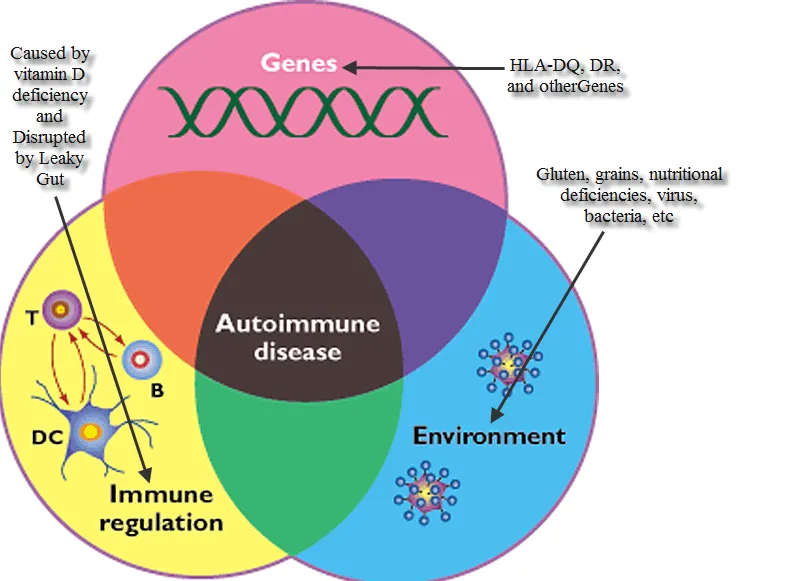Not as often as one thinks, it turns out. Assuming that “anxiety” refers to purely psychological distress due to external factors that affect one’s life, it is given a lot of undeserved credit for several undiagnosed physical conditions that can affect a human being. You go to a doctor with a strange medical symptom. If the regular exams don’t immediately categorize you into one of the commonly known diseases, their next suggestion is invariably stress and anxiety.
This comes down to one of the most common fallacies a doctor can commit. Despite our natural inclination to believe so, No Evidence of Disease does not imply Evidence of No Disease. In simple words, the fact that your doctor hasn’t found a disease, doesn’t mean that there is no disease to be found.
Sometimes, there are hidden illnesses which are difficult to discover through regular checkups. Because psychological anxiety can sometimes manifest in physical symptoms, many doctors falsely assume that all non-diagnosed symptoms are due to anxiety. It's not the case. There are many complicated processes in the human body and in many cases we cannot know how one small damage can cause another one through a domino effect.
Let’s not forget that our human body is actually a composite of several small microorganisms, others residing in the stomach, others in the intestines, and so on. Take for example the effects of the parasite Toxoplasma Gondii in mice and humans. Toxoplasma is a parasite that can infect most animals, but can only reproduce in cats’ intestines. When mice get infected with the parasite, it causes them to stop fearing the smell of cat's’ urine, and even become attracted to it. This modification in predator aversion results in infected mice to be more likely to be eaten by a cat!

Toxoplasma attaches itself to the hypothalamus of the mice brain and alters neurochemical communication. The attraction towards the predator is created by an increase in dopamine levels, a neurotransmitter associated with reward-motivated behaviors, such as sexual attraction. In other words, Toxoplasma has found a way through evolutionary adaptation to hack the brains of mice and produce behaviors that favor its own survival and reproduction (but not the infected animal’s).
It gets even more interesting for humans. A correlation has been found between infection with Toxoplasma Gondii and increased risk of traffic accidents, leading to the hypothesis that the parasite alters certain neural paths in human’s brains that control our reward system. This leads to an impulsive behavior that disregards consequences and favors immediate pleasure rewards, such as high-speed driving.
Furthermore, recent epidemiological studies suggest an association between some cases of schizophrenia and infection with the parasite, although further studies need to be done to confirm this hypothesis. It is interesting to note, however, that medications used to treat schizophrenia act by blocking dopamine receptors. When given similar medication, mice infected with Toxoplasma stop being attracted to their predators smell and returned to their regular response of fearing them.
A similar thing happens with Rabies virus, which again hacks the nervous system and causes aggression and an urge to bite in infected animals. Apart from that it causes “hydrophobia”, a fear of water. This is useful for the virus because it multiplies in the salivary glands of the infected animal, with the objective of being transmitted to more animals through biting. Since saliva has to stay in the mouth ready to be transmitted, and its swallowing would ruin its plan, the virus causes the infected animal to fear water. Symptoms include difficulty swallowing and panic when presented with liquids to drink, accompanied by painful spasms of the muscles in the throat and larynx.

There are millions of microorganisms that reside in our bodies, forming different combinations for each individual. Our personality and behavior does not depend only on external events, but also on internal battles for survival. It turns out that free will is not so free after all. Our bodies are cities with millions of inhabitants and complicated infrastructure, any modification of which contributes to our overall behavior.
Damage to an organ can certainly lead to damage in another one, and the human body is so complicated that finding the initial cause is sometimes near to impossible. Let’s take the example of a person who suffers from dangerously high blood pressure. Nearly all doctors he visited in the past have told him that the cause is anxiety, since all examinations in involved body parts (heart, lungs, arteries) showed nothing wrong. After a lot of searching, it turns out that it’s all a domino effect: an operation he had had on the right leg years ago led him to shift his body balance mainly on his left leg, leading to swelling and triggering a neurological damage. This in turn caused intense neurological pain, forcing him to resort to a chronic use of painkillers, which after a few years damaged the stomach and contributed to the condition of hiatal hernia, an abnormality where a part of the stomach slides up into the chest cavity past the diaphragm, and in his case, puts pressure on a main artery and increases blood pressure!
Consider the example of a person who has had a pulmonary autoimmune reaction possibly to an anesthetic, after two surgeries happening one too soon after another. Even if it subsides, this can trigger a long-term imbalance in the whole body’s immune system, which can end up affecting the thyroid gland with another (seemingly unrelated) autoimmune disease several years later. This can result in hypothyroidism and hormonal imbalance, manifesting in symptoms as general as weight gain, fatigue, irregular sleep patterns, low sex drive and depression. If the patient went to a regular doctor with these symptoms, would the doctor first suspect of the brief autoimmune reaction several years ago? Or would they think of stress in the workplace and send them off to a counselor? Even if they do diagnose the most recent autoimmune response on the thyroid glands, they would most likely attribute it to psychological anxiety, as it happens with most autoimmune diseases nowadays.

The above sound like Doctor House episodes, but they are real case scenarios and happen way more often than we think. Is there a correlation with anxiety? Sure there is. But correlation does not imply causation. A hidden condition can cause anxiety, not necessarily the other way around. The body feels there is something wrong with it, so the first response is obviously, stress, fatigue, conservation of energy.
There is no such thing as purely physical or purely psychological anxiety. The body’s functions are interlinked and modified with continuous feedback from external stimuli. The brain is extremely plastic and modifies itself to fit each alteration. Since there is no effective way to attribute each individual change to different causes, the concept of pure psychological anxiety is only fiction. At least for the recent trend in medical diagnosis, the term "anxiety" constitutes an overgeneralized concept usually meaning “a combination of unidentified causes”. In reality there is usually not one single cause for every symptom, which is why diseases are so hard to diagnose and unique for everyone.
